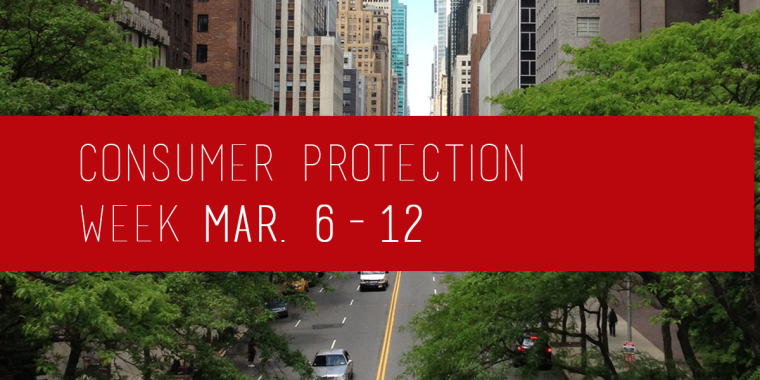Senator Venditto Highlights National Consumer Protection Week
Michael Venditto
March 7, 2016
-
ISSUE:
- Consumer Protection
-
COMMITTEE:
- Consumer Protection

Chairman of the New York Senate Consumer Protection Committee, State Senator Michael Venditto, (R, C, I- Massapequa) kicked off the start of National Consumer Protection Week by providing New Yorkers with many important links to tools to help our consumers safeguard themselves in todays digital world.
Identity Theft- Identity theft, one of the fastest growing crimes in America, occurs when someone obtains personal or financial information and uses it to acquire credit, merchandise or services. It can also occur when a thief uses credentials in the commission of a crime. Identity theft can not only ruin credit but will cost time and money to repair the damage.
Additionally, the Senate Consumer Protection Committee in recent years has made advances in helping to protect child identity theft. New Yorkers who are parents or guardians may now place a "freeze" on their child's social security number with the credit agencies.
"Think Before You Click.” Today, adults and children alike are clicking away and accessing information on the internet and social media sites via Smartphones, personal devices, desktops and laptops.
Elder Financial Exploitation- If someone feels they are a victim of exploitation, encourage them to contact the local authorities, the state Attorney General, the Better Business Bureau and their financial institution.
The New York State Department of State in partnership with the Harry & Jeannette Weinberg Center for Elder Abuse Prevention, the State Office for the Aging, AARP and the Free Community Papers of New York (FCPNY) host a monthly toll-free "Senior Consumer Information Line" which allows Seniors statewide to access free information they can use to stay safe, maximize their independence and improve their everyday lives. Seniors can access the line by dialing 1-800-503-9000.
The New York Attorney General also offers seniors a Financial Protection Plan one page worksheet you can download here and read before you invest in any financial product.
Home Improvement Scams - As home improvement season approaches, the Department of State is advising New York State residents to use caution when hiring a contractor to repair, improve or remodel their home.
Although many consumers are ultimately satisfied with their contractor’s work, there are instances where they face difficulty or financial loss due to an unpleasant experience with a home improvement contractor. Home improvement contractors perform a broad variety of work inside and outside the home, including carpentry, kitchen and bathroom renovation, basement finishing, masonry, chimney maintenance, roof repair and landscaping.
In addition to checking references, consider these contractor-related tips:
- Beware of Unsolicited Offers
- Licensing Requirements
- Get Written Estimates
- Get a Written Contract
- Get Proof of Insurance
Consumer Product Safety- Each year, millions of consumer products are recalled in the United States. These products can vary widely from food, electronics, furniture, children’s toys and accessories, etc.
Taxpayer Scams- The New York State Division of Consumer Protection is alerting New York taxpayers to be vigilant against scams targeting taxpayers not only during tax season (reminder, the tax deadline is April 15), but also year-round.
Taxpayer scams can take on a variety of forms including phone calls from individuals posing as officials from the Internal Revenue Service (IRS).
The New York State Division of Consumer Protection warns consumers to be wary of phone calls requesting money or personal information. To prevent falling victim to this type of scam, please take note of the following tips:
- Keep in mind that the IRS will typically first initiate contact with a taxpayer concerning a tax issue via mail. The IRS does not request personal or financial information through email and will not ask for credit card numbers over the phone.
- Call the IRS at 1-800-829-1040 if you think you owe taxes or need help with a payment issue.
- Hang up the phone immediately if someone claiming to be from the IRS unexpectedly calls and threatens police arrest, deportation or license revocation.
- Report anything suspicious to the Treasury Inspector General for Tax Administration at 1-800-366-4484 and the Federal Trade Commission (FTC). Please visit the FTC website at www.ftccomplaintassistant.gov and add "IRS Telephone Scam" to the comments of your complaint.
- Scam artists fraudulently posing as tax preparers.



